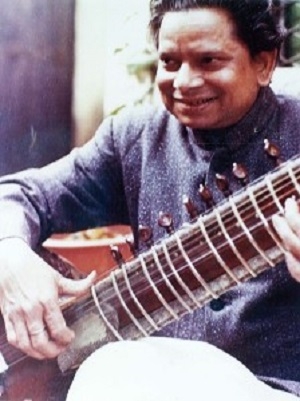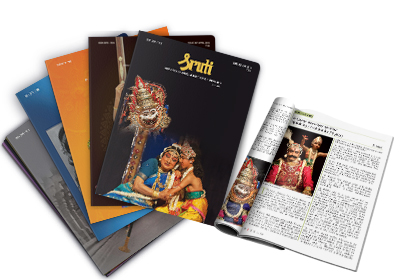
Balaram Pathak
Sitar maestro Pandit Balaram Pathak hailed from an refined musical stock, tracing the family tradition to his great grandfather, the late Pandit Dinanath Pathak, renowned sitar and surbahar player of the dhrupadi style. His father, the late Pandit Ramgovind Pathak and his uncle, Rameshwar Pathak, illustrious musicians and singers, helped the young Balaram become fluent in the sitar, surbahar, sursingar and vocal Hindustani classical music.
Balaram Pathak was born on November 5, 1926 in Balia, Uttar Pradesh. By the age of ten, he was practising nearly 18 hours a day under the watchful eyes of his father and uncle. In 1938 came his first public appearance in Murshidabad, West Bengal, at the tender age of 12. He created a tremendous impact with his winsome visage and rare artistic display, impressing the great master-musicians of his time. One review in later years that truly summed him up: “This great musician was also a great man. His laughing and mischievous eyes, from which a child-like purity filters, and his simplicity and unaffected manners are as eloquent as his music”.
His keen senses were able to grasp all the finer points of dhrupad and khayal in his singing and also in instrumental display. Soon he became a court musician with Maharaja Kamla Ranjan Roy of Cossim Bazaar, Murshidabad, West Bengal.
Along with his perfection and precision in the rendition of ragas, his authentic style, complete control over rhythm and clarity of tone created a distinctive blend of originality and novelty. His alap, meends, gamaks, mukhris and zamzamas produced a thought-provoking and poignant ambience at once inspirational and emotional. Intense research into both Hindustani and Carnatic music inspired him to launch new ragas like Charukeshi, Latangi and Shanmukhapriya. The “Raag Bahadur Shastri” he invented was a musical dedication to one of India’s Prime Ministers, the late Lal Bahadur Shastri.
The decades of his musical career saw him perform at music festivals and concerts all over the country in addition to regular performances as top grade artist of All India Radio, Calcutta, and his position as Head of the Music Faculty of Khairagar University in Madhya Pradesh. He was awarded the title of ‘Sur Sadhak’ at the Calcutta Music Conference.
The Government of India named him ‘Special Delegate’, performing to audiences in many European countries; some of his musical records were released in France. He received the Sangeet Natak Akademi award in 1989.
Balaram Pathak’s pioneering efforts resulted in his use of harmonics on the sitar and recording this musical arrangement on compact discs for posterity and future study. With his matchless talent and style he inspired several sitar players and vocalists after his time.
Pandit Balaram Pathak passed away on February 15, 1991 in New Delhi but the full scope of his musical talent and legacy are kept alive by his four sons - Ashok (sitar & surbahar), Vinode (tabla), Benoy (harmonium) and Pramod (vocal), accomplished and feted musicians in their own right. Ashok Pathak’s performances all over India and abroad receive great appreciation.


